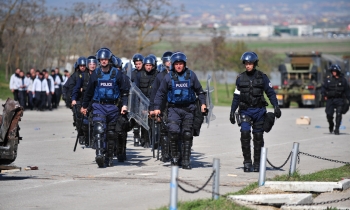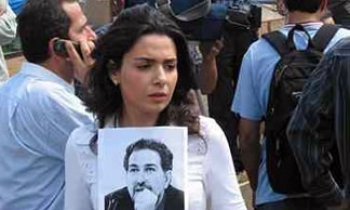The Islamic Republic of Iran now ranks alongside China as the world’s biggest prison for journalists, according to Paris-based Reporters sans Frontières (RSF) . The crackdown has been intensified yet again following Supreme Leader Ali Khamenei’s endorsement of the result of the June 12 presidential election and the opposition’s decision to call another demonstration on June 20.
Iran now has a total of 33 journalists and cyber-dissidents in its jails, while journalists who could not be located at their homes have been summoned by telephone by Tehran prosecutor general Said Mortazavi.
“The force of the demonstrations in Tehran is increasing fears that more Iranian journalists could be arrested and more foreign journalists could be expelled,” RSF said. “The regime has been visibly shaken by its own population and does not want to let this perception endure. That is why the media have become a priority target.”
It has emerged that Mohammad Ghochani, the editor of Etemad Meli (a daily owned by Mehdi Karoubi, one of the opposition presidential candidates), was arrested at 2 a.m. on June 18. Intelligence ministry officials took him away to an unknown location, probably the security wing of Tehran’s Evin prison.
Ghochani is also the editor of the dailies Shargh and Hammihan and the weekly Saharvand Emroz. The publication of all these newspapers had already been suspended before his arrest.
RSF has also learnt that blogger and human rights activist Shiva Nazar Ahari was arrested at her Tehran home on June 14. (see her blog: http://azadiezan.blogspot.com). Husband-and-wife journalists Bahaman Ahamadi Amoee and Jila Baniyaghoob were arrested at midnight of June 20 by intelligence ministry officials in plain clothes who searched their home and then took them away to an as yet unknown location, probably the security wing of Tehran’s Evin prison.
A winner of the Courage in Journalism prize awarded by the International Women’s Media Foundation, Baniyaghoob edits a news website that focuses on women’s rights, Canon Zeman Irani (http://irwomen.net). Her husband, Amoee, writes for various pro-reform publications.
RSF has also been able to confirm that Ali Mazroui, the head of the Association of Iranian Journalists, was arrested in the morning of June 20.
The BBC confirmed in the afternoon of June 21 that its Tehran correspondent, Jon Leyne, has been ordered to leave the country within 24 hours. Officials accused him of “supporting rioters”. The authorities had previously accused Britain of “conspiring“ against Iran.
Journalists and activists held in Evin prison are being put under a lot of pressure to make filmed “confessions” acknowledging their participation in a “velvet revolution.” Reporters Without Borders has also received many allegations of torture.
Foreign news agency correspondents are being pressured not to report anything about the opposition. A few hours after Ayatollah Khamenei’s speech Saturday endorsing Ahmadinejad’s election and banning any demonstrations, several videos were posted online showing individuals on rooftops chanting “Allah Akbar!”
After being blocked since 11 June, the Iranian news website Entekhab (www.entekhabnews.com/) has now been closed down on the orders of the Tehran prosecutor general.
At least 20 journalists had already been arrested since June 12. RSF has not been able to trace many others. Some may have found refuge but others may now be with those of their colleagues who had already been in jail for some time. Even before the election, Iran was ranked as the Middle East’s biggest prison for journalists and cyber-dissidents.









